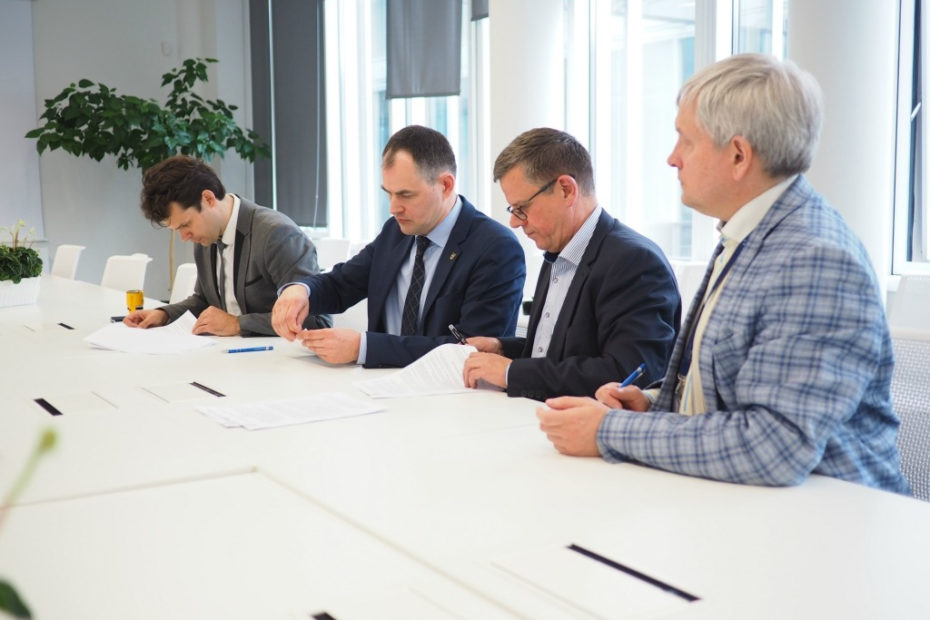The country‘s leading research centers – the Center for Physical Sciences and Technology (FTMC), the Lithuanian Energy Institute (LEI), the Lithuanian Research Center for Agriculture and Forestry (LAMMC) and the Science and Technology Park of the Institute of Physics – have established a Research and Technology Organization (RTO).
It will act as an association with the aim of consolidating the country’s potential in applied research by expanding the high value-added industrial sector while maintaining the organizational flexibility of the centers.
The Institutions establishing the Lithuanian Research and Technology Organization:
- have all the characteristics of Research and Technology Organizations – high-level scientific potential, international-level applied research and R&D activities, innovative services and problem-solving, expertise in high-tech enterprise generation and incubation;
- are guided by the following core values – high quality science and a rational balance between fundamental and applied research, close cooperation, flexibility and practicality;
- strive to develop effective institutional synergies by finding systemic solutions based on diverse scientific and technological competences. Also, based on scientific knowledge, develop a consistent high value-added chain.

Research and Technology Organizations (RTOs) are institutions coordinating the activities of non-university research institutes or centers that support development of high-tech industries and other sectors of economy as well as promote innovation. RTO seeks to transfer scientific knowledge to business, transform it into new products or high value-added technologies and services. Specific forms of activity depend heavily on the level of scientific potential of the country / region, the structure of the economy and the traditions of high added value creation.
“We join forces in order to strengthen cooperation, develop interdisciplinary science, consolidate project activities and protect intellectual property. We believe that our coordinated actions will contribute to the development of a high-tech industry sector that is not large in the country today. We will do this by generating scientific knowledge that can open new markets for the high-tech industry in the next 5-10 years. We will do this by promoting an entrepreneurial spirit by creating and incubating new generation startups, providing R&D, technology and innovation services and sharing our international experience. Our center aims to capitalize on scientific knowledge and research, and it is important for us that there would be as many knowledge-intensive companies in Lithuania as possible,” says FTMC director prof. Gintaras Valušis.
According to LEI Director Dr. Sigitas Rimkevičius, the establishment of the Research and Technology Organization will contribute to establishing links with domestic and foreign industries:
“The joint activities and competences of research institutions are much wider than those of individual research centers. Now we will be much more powerful and smarter, we will be able to contribute more effectively not only to solving industrial problems, but also to propose innovative solutions for national economy.
No less important is the RTO’s mission to engage with the public and the state’s most important issues: reducing climate change, developing sustainable (environment-friendly) energy, and so on. Collaborating with international partners, engaging in international networking organizations such as the European RTO Association (EARTO) provides a clear added value in addressing global challenges. Establishment of RTO in Lithuania will help to respond in a coordinated and effective way to the most pressing problems of the society, the state and business, and to offer the most effective solutions. Together we will be able to integrate more fully into the map of the European Research Area, to participate more successfully in European research programs.”
Director of LAMMC dr. Gintaras Brazauskas says that the emergence of new synergies will greatly broaden the range of innovations for agriculture and forestry:
“In Lithuania, the agricultural and forestry sector generates a large part of the country’s exports. Sustainable development in this area without high-precision technologies will not be achieved. Innovative solutions for efficient use of resources, new physical and chemical ideas for creating highly sensitive sensors for remote species status monitoring, will help to raise the standards of creation of added value in this sector. We will be able to use the natural resources of the country in a sustainable way and to maintain a healthy environment that meets the needs of society.”
Science and technology parks are generally those most directly involved in support of high-tech startups in the science and technology sector, Julius Paužolis, Director of the Science and Technology Park of the Institute of Physics, says:
“For nearly ten years, we have been purposefullydeveloping the park. So now we can offer young technology companies a benefitial package of services: to prepare a business plan, to find the first clients, and to have foreign traineeships. We help advertise the company, apply for funding, and provide safe work premises for the company in laboratories, produce a test prototype or a series of components for the device.
We coordinate the activities of the LITEK cluster, well-known in the international community, so we have established good relations with the foreign clusters, uniting hundreds of innovative companies in different European countries. Therefore we can offer useful contacts to our startups for future beneficial collaboration.
I think, that our park will become home for companies initiated by the Research and Technology Organization. And the joint work in the Research and Technology Organization will create additional opportunities for transfer of knowledge and technology to business in economically important branches of Lithuanian industry.”
Today, the Research and Technology Organization consists of 4 members: 3 leading science centers and the Science and Technology Park. However, the organization is open and invites all those who share the goals, attitudes and values outlined above.
Contacts of the Research and Technology Organization:
prof. Gintaras Valušis
Director of the Center for Physical and Technological Sciences
tel. +370 5 264 9211
